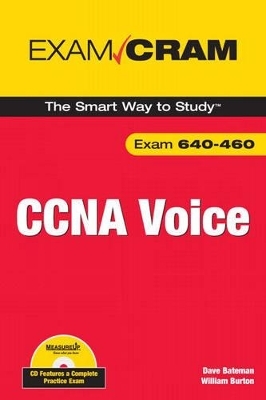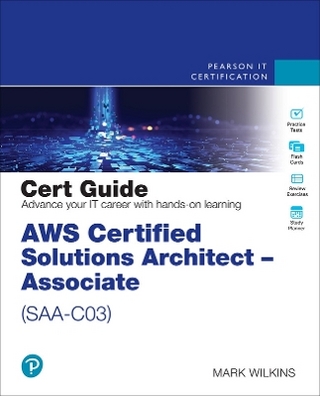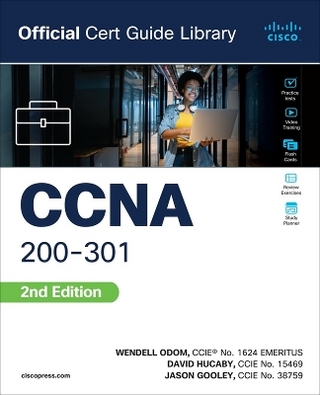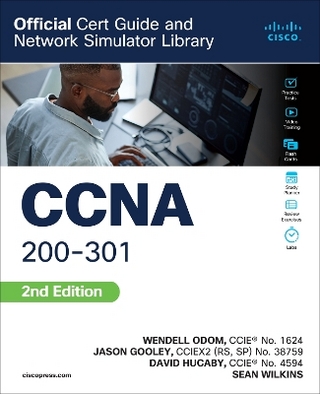
CCNA Voice Exam Cram
Pearson IT Certification
978-0-7897-3799-1 (ISBN)
- Titel ist leider vergriffen;
keine Neuauflage - Artikel merken
IIUC Exam 640-460
David Bateman
William Burton, CCIE No. 1119
In this book you’ll learn how to
Understand digital and analog circuits
Use voice signaling protocols
Connect your VoIP system to the rest of the world
Configure your network to support VoIP
Configure QoS and Cisco AutoQoS
Configure Cisco Unified CME to support endpoints and connect to a service provider
Configure Cisco Unity Express
Implement business features
Maintain and troubleshoot Cisco Unified CME and Cisco Unity Express
Implement the Smart Business Communications System
WRITTEN BY LEADING EXPERTs:
David Bateman is a certified Cisco instructor with more than 20 years of internetworking experience. David is currently the director of curriculum development for Skyline-ATS.
William Burton, CCIE No. 1119, CCVP, CCNP, CCVA, CCNA, is an author, instructor, and IT implementer with more than 35 years of experience. Mr. Burton’s experience includes small to global network architecture and deployments for federal agencies, state and local governments, corporations, and educational institutions.
CD Features Test Engine Powered by MeasureUp!
This book includes a CD-ROM that features
Complete coverage of CCNA Voice exam objectives
Practice exams with detailed explanations of correct and incorrect answers
Multiple exam modes
An electronic copy of the book
informit.com/examcram
ISBN-13: 978-0-7897-3799-1
ISBN-10: 0-7897-3799-X
David J. Batemanis a certified Cisco instructor with more than 20 years of internetworking experience. In addition to teaching, he is involved in authoring courses and books, including Configuring Cisco CallManager and Unity: A Step-by-Step Guide, published by Cisco Press. David currently is the director of curriculum development for Skyline-ATS. His years of real-world technical and business knowledge allow him to bring a unique perspective to the classroom, where he not only delivers critical technical knowledge but also explains how technologies can be used to address various business needs. William E. Burton,CCSI, CCIE No. 1119, CCVP, CCNP, CCVA, CCNA, is an author, instructor, and IT implementer with more than 35 years of experience. Mr. Burton’s experience includes small to global network architecture and deployments for federal agencies, state and local governments, corporations, and educational institutions. He also has extensive programming experience in the telephony arena at AT&T Long Lines and Bell Labs.
Introduction
Self Assessment
Part I: Traditional Telephony
CHAPTER 1:Traditional Telephony Overview
Understanding the Legacy PSTN
Business Phone Systems
Call Signaling
Supervisory Signaling
Addressing
Informational
PSTN Call Setup
Numbering Plans
E.164 Addressing
Exam Prep Questions
Answers to Exam Prep Questions
CHAPTER 2:Introducing Analog Circuits
Analog Telephone Components
Foreign Exchange Trunks
Foreign Exchange Station
Foreign Exchange Office
Understanding Circuit Types
Loop Start
Ground Start
E&M
Exam Prep Questions
Answers to Exam Prep Questions
Suggested Reading and Resources
CHAPTER 3: Introducing Digital Circuits
From Analog to Digital: Coder/Decoder (Codec) Revealed
Sampling
Quantization
Encoding Quantized Values to Binary
Compression
Introducing TDM
Understanding Circuit Types
T1 Circuits
E1 Circuits
Understanding Signaling Types
Channel-Associated Signaling (CAS)
CCS
Summary
Exam Prep Questions
Answers to Exam Prep Questions
Suggested Reading and Resources
Part II: VoIP
CHAPTER 4: Voice to VoIP
Introducing Digital Signal Processors
Understanding Transport Protocols
Real-Time Transport Protocol
Real-Time Transport Control Protocol
Packetizing Voice Streams
G.711 Codec
G.729 Codec
Understanding Codecs
Comparing G.729 and G.729a Codecs
Understanding the Effect of VAD
Additional DSP Functions
Echo Cancellation
Conferencing
Transcoding and Media Termination Point
Exam Prep Questions
Answers to Exam Prep Questions
Suggested Reading and Resources
CHAPTER 5: Functions of VoIP Signaling Protocols
SCCP
H.323
MGCP
SIP
Exam Prep Questions
Answers to Exam Prep Questions
Suggested Reading and Resources
CHAPTER 6: Connecting Your VoIP System to the Rest of the World
Understanding Gateways
Analog Gateways and Voice Ports
Digital Gateways and Voice Ports
Digital Gateways
Understanding Call Legs
Understanding Dial Peers
Dial Peer Overview
POTS Dial Peers
VoIP Dial Peers
Dial Peer Commands
Matching Dial Peers
Using Internet Telephony Service Providers
Exam Prep Questions
Answers to Exam Prep Questions
Suggested Reading and Resources
CHAPTER 7: Configuring the Network to Support VoIP
Understanding the Theory of Voice VLANs
Configuring Voice VLANs
VLANs and an External Router
Router with Built-in Switch Ports
Power over Ethernet
Essential Network Services: DHCP and NTP
DHCP Services
DHCP Relay Service
Network Time Protocol
Understanding the Phone Bootup Process
Installing Cisco IP Phone Firmware and XML Configuration Files
Firmware
Device Configuration XML File
Default XML File
Exam Prep Questions
Answers to Exam Prep Questions
Suggested Reading and Resources
CHAPTER 8: Reviewing QoS and Configuring the Cisco AutoQoS Feature
Defining QoS
Why Converged Networks Need QoS
Networks Before Convergence
Networks After Convergence
Measurable QoS Issues: Bandwidth, Delay, Loss, and Jitter
Bandwidth Capacity
End-to-End Delay
Packet Loss
Variation of Delay: Jitter
Techniques to Solve QoS Issues
QoS Traffic Tagging for IP and LAN Traffic
The IP Header TOS Field
The CoS Field for Layer 2 Frames
Understanding QoS Traffic Requirements
Voice
Video
Data
Building a QoS Policy for Converged Networks
Identifying the Network Traffic
Divide the Traffic into Service Classes
Define Policies for Each Service Class
An AutoQoS Primer
Trust Boundaries
Cisco Devices That Support AutoQoS
Exam Prep Questions
Answers to Exam Prep Questions
Part III: Cisco Unified CME and Unity Express in Business
CHAPTER 9: Introducing Cisco Unified CME
Understanding the Benefits of Cisco Unified CME
Understanding Cisco Unified CME Features
Phone Features
System Features
Trunk Features
Voicemail Features
Knowing the Hardware and Software Requirements
Required Platform
Software and Licensing
Exploring Supported Endpoints
Exam Prep Questions
Answers to Exam Prep Questions
Suggested Reading and Resources
CHAPTER 10: Configuring Cisco Unified CME to Support Endpoints
Ephones and Ephone-dns
Configuring Ephones
Configuring Ephone-dns
Configuring Telephony Service
Telephony Service Commands
Firmware Provisioning
Registration Configuration
Endpoint Verification
Endpoint Reboot
Exam Prep Questions
Answers to Exam Prep Questions
Suggested Reading and Resources
CHAPTER 11: Configuring Cisco Unity Express
Setting Up Cisco Unity Express Voicemail
Cisco Unity Express Platforms and Capacities
Cisco Unity Express Features and Functionality
Preintegration CLI Configuration
Installation and Upgrade Procedure
GUI Initialization Wizard
Using Cisco Auto Attendant
Activating the Auto Attendant
Managing Prompts with the GUI and AVT (TUI)
Troubleshooting Cisco Unity Express
Host Router CLI Tools
Exam Prep Questions
Answers to Exam Prep Questions
CHAPTER 12: Implementing Business Features
Configuring Common Features
Call Forward
Call Transfer
Call Park
Call Pickup Groups
Intercom
Configuring Additional Features
Paging
MOH
Directory Services
Call Blocking
Call Accounting
Exam Prep Questions
Answers to Exam Prep Questions
Suggested Reading and Resources
CHAPTER 13: Maintaining and Troubleshooting Cisco Unified CME
Backup and Restore
Troubleshooting the Cisco Unified CME Installation
Initial IP Phone Activation and Registration Issues
Common show Commands Used to Verify CUCME Operations
Exam Prep Questions
Answers to Exam Prep Questions
Part IV: Cisco Smart Business Communications System
CHAPTER 14: Introducing the Smart Business Communications System
SBCS Overview
Cisco Unified Communications 500 Series Platform
Catalyst Express Switches
Supported Endpoints
Using Additional SBCS Features
SBCS Wireless Features
SBCS Security Features
Understanding the Cisco Configuration Assistant
Exam Prep Questions
Answers to Exam Prep Questions
Suggested Reading and Resources
CHAPTER 15: Implementing the Smart Business Communications System
Installing CCA and Managing the SBCS
Setup
Device Properties
Graphical Views
Upgrading
File Management
Cisco Configuration Assistant: Voice Configuration
Device
System
Network
Auto Attendant and Voicemail
SIP Trunk
Voice Features
Dial Plan
Users
Cisco Configuration Assistant: System Configuration
Configure Port Settings
Configure Security
Configure Wireless
Configure Routing
Monitoring SBCS with CCA
View the Health of a Cisco Smart Business Communications System
Review and Respond to Cisco Smart Business Communications System Events
Review and Respond to Cisco Smart Business Communications System Messages
Maintaining SBCS with CCA
Software Upgrade
Back Up and Restore Device Configurations
Reset a Cisco Smart Business Communications System to a Factory Default State
Exam Prep Questions
Answers to Exam Prep Questions
Part V: Practice Exams and Answers
CHAPTER 16: Practice Exam 1
CHAPTER 17: Practice Exam 1 Answer Key
CHAPTER 18: Practice Exam 2
CHAPTER 19: Practice Exam 2 Answer Key
Part VI: Appendixes
Appendix A: Cisco Unified Communications Overview
Appendix B: What’s on the CD-ROM
Glossary
078973799x TOC 12/19/2008
| Erscheint lt. Verlag | 26.2.2009 |
|---|---|
| Verlagsort | Upper Saddle River |
| Sprache | englisch |
| Maße | 151 x 229 mm |
| Gewicht | 640 g |
| Themenwelt | Mathematik / Informatik ► Informatik ► Netzwerke |
| Informatik ► Weitere Themen ► Zertifizierung | |
| ISBN-10 | 0-7897-3799-X / 078973799X |
| ISBN-13 | 978-0-7897-3799-1 / 9780789737991 |
| Zustand | Neuware |
| Haben Sie eine Frage zum Produkt? |
aus dem Bereich


